捷进英语3 Unit6-电子教案
中职《英语基础教程》第三册-Unit6-电子教案
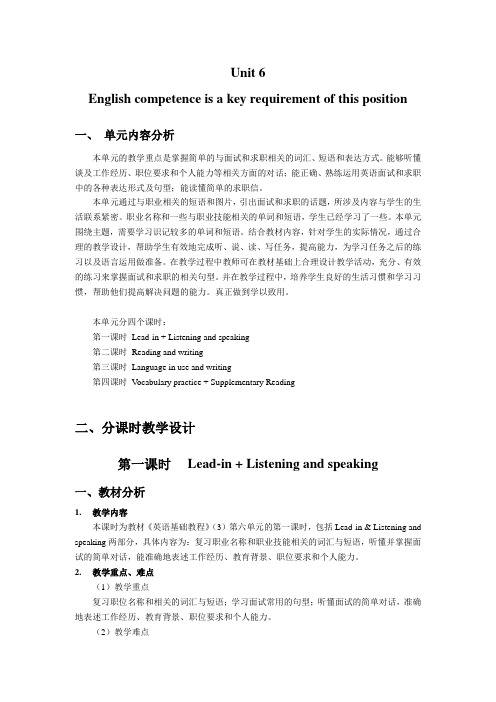
Unit 6English competence is a key requirement of this position 一、单元内容分析本单元的教学重点是掌握简单的与面试和求职相关的词汇、短语和表达方式。
能够听懂谈及工作经历、职位要求和个人能力等相关方面的对话;能正确、熟练运用英语面试和求职中的各种表达形式及句型;能读懂简单的求职信。
本单元通过与职业相关的短语和图片,引出面试和求职的话题,所涉及内容与学生的生活联系紧密。
职业名称和一些与职业技能相关的单词和短语,学生已经学习了一些。
本单元围绕主题,需要学习识记较多的单词和短语。
结合教材内容,针对学生的实际情况,通过合理的教学设计,帮助学生有效地完成听、说、读、写任务,提高能力,为学习任务之后的练习以及语言运用做准备。
在教学过程中教师可在教材基础上合理设计教学活动,充分、有效的练习来掌握面试和求职的相关句型。
并在教学过程中,培养学生良好的生活习惯和学习习惯,帮助他们提高解决问题的能力。
真正做到学以致用。
本单元分四个课时:第一课时Lead-in + Listening and speaking第二课时Reading and writing第三课时Language in use and writing第四课时V ocabulary practice + Supplementary Reading二、分课时教学设计第一课时Lead-in + Listening and speaking一、教材分析1.教学内容本课时为教材《英语基础教程》(3)第六单元的第一课时,包括Lead-in & Listening and speaking两部分,具体内容为:复习职业名称和职业技能相关的词汇与短语,听懂并掌握面试的简单对话,能准确地表述工作经历、教育背景、职位要求和个人能力。
2.教学重点、难点(1)教学重点复习职位名称和相关的词汇与短语;学习面试常用的句型;听懂面试的简单对话,准确地表述工作经历、教育背景、职位要求和个人能力。
Unit6-电子教案

write the three headings on
the stude nt
the board and ask students
for
un dersta nd
to write their own summary
lear ning
the text. It
senten ces.
also
The first vocabulary tasks
教案
课程名称捷进英语综合教程2
课 时பைடு நூலகம்
班 级
专 业
教 师
系 部
教研室
教 材《捷进英语综合教程2教师用书》
Teach ing Plan
教学
单元
Un it6In My Mi nd
单元
主题
Sense and memory
Impro ving your memory
Perfect memories
课
时安
排
8
教 学 内 容
tasks work on
in the prese nt and past
the meaning of
simple. Task 2 contains
thematic words
JOIN IN 3 Unit 6 Life in the Arctic 教案
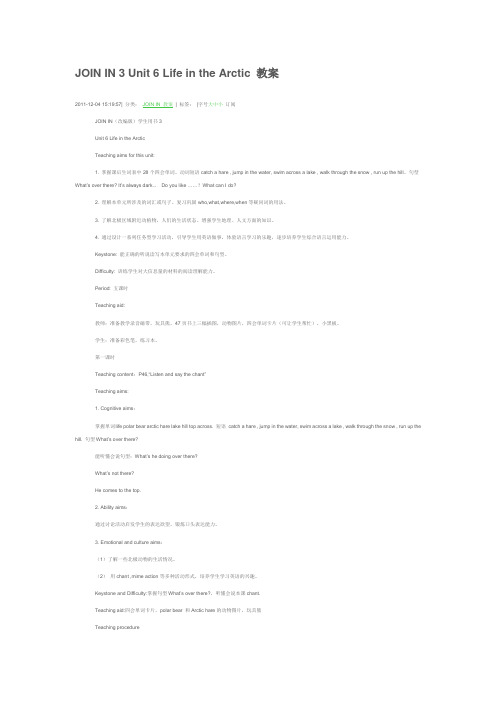
JOIN IN 3 Unit 6 Life in the Arctic 教案2011-12-04 15:19:57| 分类:JOIN IN 教案| 标签:|字号大中小订阅JOIN IN(改编版)学生用书3Unit 6 Life in the ArcticTeaching aims for this unit:1. 掌握课后生词表中28个四会单词。
动词短语catch a hare , jump in the water, swim across a lake , walk through the snow , run up the hill。
句型What’s over there? It’s always dark.。
Do you like ……?What can I do?2. 理解本单元所涉及的词汇或句子。
复习巩固who,what,where,when等疑问词的用法。
3. 了解北极区域附近动植物,人们的生活状态。
增强学生地理、人文方面的知识。
4. 通过设计一系列任务型学习活动,引导学生用英语做事,体验语言学习的乐趣,逐步培养学生综合语言运用能力。
Keystone: 能正确的听说读写本单元要求的四会单词和句型。
Difficulty: 训练学生对大信息量的材料的阅读理解能力。
Period: 五课时Teaching aid:教师:准备教学录音磁带,玩具熊,47页书上三幅插图,动物图片,四会单词卡片(可让学生帮忙),小黑板。
学生:准备彩色笔,练习本。
第一课时Teaching content:P46,―Listen and say the chant‖Teaching aims:1. Cognitive aims:掌握单词life polar bear arctic hare lake hill top across. 短语catch a hare , jump in the water, swim across a lake , walk through the snow , run up the hill. 句型What’s over there?能听懂会说句型:What’s he doing over there?What’s not there?He comes to the top.2. Ability aims:通过讨论活动启发学生的表达欲望,锻炼口头表达能力。
(捷进英语1)Unit6-电子教案
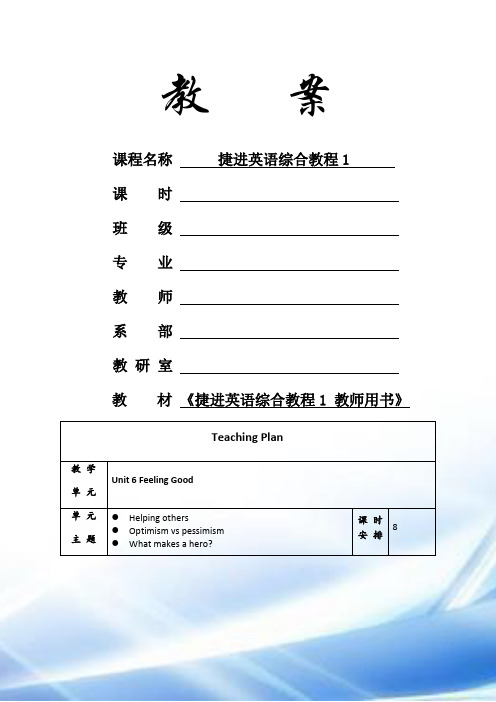
教案课程名称捷进英语综合教程1课时班级专业教师系部教研室教材《捷进英语综合教程1 教师用书》Teaching Plan教学单元Unit 6 Feeling Good单元主题●Helping others●Optimism vs pessimism●What makes a hero?课时安排8教学内容●Reading for learningWould You Like to Make a Difference?●Reading for DoingHalf Full or Half Empty?●Guided WritingA Letter of Thanks●Audio/Video Lab教学环节主要特色教学活动安排建议Warm-up(热身)This section introducesthe idea of feelings andreactions. It does thisthrough a set ofadjectives and musicclips for students toreact to.✧Depending on the time you have available,you could extend this into students playingtheir own music and discussing how themusic makes them feel.Reading (阅读)Readingforlearning◆This section startswith usingpronoun referentswhen reading tohelp understandthe organisation ofa text. It thenencouragesstudents to workout reasons in thetext.◆Vocabulary andGrammarStudents look atphrases and individualwords from the text.The grammar focus✧In Task 4 of Reading and Understanding,you could ask students to compare theirtranslations with a partner. Then ask studentsto close their books and translate them backinto English.✧In Vocabulary Focus, the three vocabularytasks draw on the text. Task 1 and Task 3 arealso a set of questions and so work well aspair-work discussion tasks.✧The Grammar Focus part looks at differentways of referring to the past, present andfuture with quite simple structures. Afterworking through the tasks you would setstudents a short written or spoken task usingthese structures to refer to their own desiresin the past present and future.✧Beyond the Text encourages students to reactlooks at would like to, like to and wanted to.◆Beyond the TextStudents interpret their own decisions. personally to the texts they have read. It also practices the grammar structure. Students could also think about and discuss their own good deeds.Reading for doing ◆Students read andanswer aquestionnaire onoptimism andpessimism.✧This section should take less time thansection A as the text is less complicated.They focus on developing students’ everydayreading skills as they are reading andresponding to a questionnaire.✧If time permits, students could create theirown scenario and options for others tochoose as an additional question in thequestionnaire.Guided Writing ◆Writing a letter ofthanks:(1) Formal expressionsof thanks(2) Informalexpressions ofthanks ✧When checking Task, 2 you could highlightsome of the other features of informality aswell as the vocabulary / phrases focused on,e.g. the punctuation and contractions.✧With weaker students you might want toshow them the model first before they writetheir email.Audio/Video Lab ◆Students watch avideo showingan interviewwith someonewho has donesomethingheroic:(1) making predictions(2) dictating andansweringquestions ✧Write hero onto the board and ask students todefine the word and to think of an example of one.✧When you get to Task 5, you will probablyneed to pause briefly between each question.Wrap-up ◆This sectionprovides a quickreview of thevocabulary,grammar, writing ✧For Task 1, Task 2 and Task 3 on thelanguage work, you might want to set themup as a team game or class quiz.✧For Task 4, it could be set as small groupand theme of theunit.◆Tasks could be setfor individualwork or done inpairs.discussion task.课后学习设计作业◆Finish all the exercises in Unit 6.◆Read the two texts in this unit again and try to summarisetheir contents.◆Write a letter of thanks to a person who ever helped you.课后总结和反思。
英语基础模块3unit6教学设计

—What role can smiling play in our daily life?
—Smiling plays an important role in our daily life.
学生重复两三遍此问答。接着,教师教学生说:Smiling can help us and everyone around us live a longer, healthier and happier life.除以上答案外,鼓励学生畅所欲言,教师给予适当的帮助和补充。
2.任务型教学法
3.竞争激励学习法
4.自主学习法
教学
手段
多媒体课件、PPT、Mp3音频、动画微课等
教学过程
教学内容
活动分析
教学设计问题进行热身开头的活动,不如说本活动的目的
是将学生带动起来把微笑传递给他人。建议教师以拍一张集体微笑照的活动开始,再带入同学们对这三个问题的讨论,则将大大地调动学生参与本单元学习的积极性。
4.让学生了解不同国家对微笑的认知,更好地理解中外文化非语言交流的差异;
5.多安排学生进行两人问答,培养学生积极参与学习的意识及合作学习、探究学习的好习惯。
教学
重点
重点词汇和短语
comfort, pleasant, cheerful, under pressure, give me five, pass on, blood pressure
活动2
本部分是讨论匹配题,旨在引导学生感受教材图片展示的男女老少不同人物、不同场合的微笑,感受微笑带给我们生活的美好。通过小组讨论,掌握不同类型微笑的英文表达。
1.教师先让学生朗读图片中的四个短语,遇到不会的词先跳过,继续往下读,教师做到心中有数。
Book 3 Unit 6电子教案新部编本
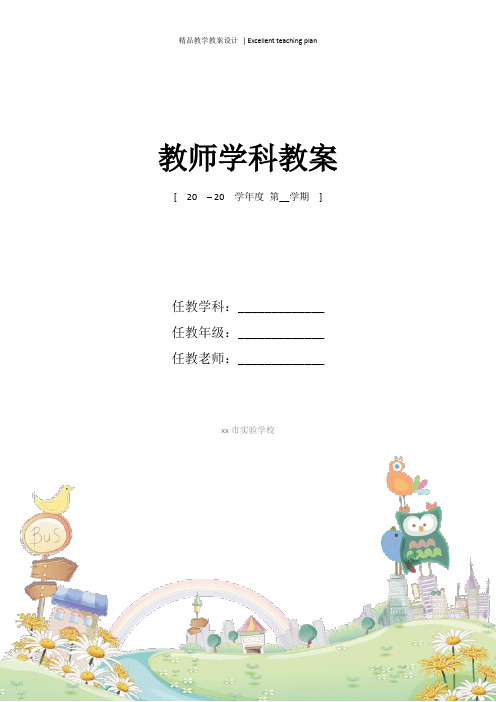
教师学科教案[ 20 – 20 学年度第__学期]任教学科:_____________任教年级:_____________任教老师:_____________xx市实验学校Unit Six1.Movie ClipWatch the movie clip and answer the following questions.1.What are so many girls queuing up for?They are queuing to get into the brand sale for bargains.2.Why did the girl struggle when she found the Pucci boots?Because she knew she didn’t need it, but she couldn’t resist the temptation of its low price.Discussion:Some people have the same shopping experience as the girl in the movie clip. What suggestions will you give them to get rid of their impulsive buying behaviour? This is an open question.Script(They have Gucci half off, Calvin Klein hal f off! You’ll get your turn, just be patient.)- At every point I will ask, “Do I need this?”- There’s another entrance this way!- Well, these cashmere gloves I need as it is winter and I have ... hands. So that’s all. I’II buy these and these alone.- Now walk away, strong and frugal. Oh, my God! Pucci boots. Fifty-percent off? Do I need these? Do I need these? Do I need these? No.- Jeannie, Pucci boots!- Uh, oh, I’m so sorry. I had ’em first.- But you put them down.- No, I know I did, but I saw ’em first, so I’m gonna take ’em.- Then you took your hands off them.- Give me the boots, and no one gets hurt!- Give me the boots.- Give me the boots! Look! There’s a sale on Burberry!- That’s the oldest trick in the book!- Give ’em!- Don’t you te ll me ...- Give me the boots!- I waited in line all morning for this!- Your store card is like a 50 percent-off cashmere coat. The first time you meet, it promises to be your best friend. Until you look closely and real ize it’s not real cashmere.2. QuotesRead the following quotes and tell your classmates which one is your favorite. State your reasons.Reading maketh a full man, conference a ready man, and writing an exact man.— Francis BaconSome books are to be tasted, others to be swallowed, and some few to be chewed and digested.— Francis BaconBooks are to mankind what memory is to the individual.— John LubbockPeople die, but books never die. No man and no force can abolish memory.— Franklin RooseveltBooks are the quietest and most constant of friends; they are the most accessible and wisest of counselors; and the most patient of teachers.— C. W. EliotIf well used, books are the best of all things; if abused, among the worst.— R. W. EmersonThe reading of all good books is like a conversation with the finest men of past centuries.— Rene DescartesReading is not merely sympathizing and understanding; it is also criticizing and judging.— Virginia WoolfListening In and Speaking Out1.Notes2.Listening3.Speaking Practice1.Notes1.Internet marketing— also known as digital marketing, web marketing, online marketing, ore-marketing, is the marketing of products or services over the Internet. It is considered to be broad in scope because it not only refers to marketing on the Internet, but also includesmarketing done via e-mail and wireless media.ics— a graphic medium in which images convey a sequential narrative3.dissertation— a treatise advancing a new point of view resulting from research, usually arequirement for an advanced academic degree4.cater to— provide all the things that are needed or wanted5.collectible— worth collecting6.ISBN— The International Standard Book Number (ISBN) is a unique numeric commercialbook identifier developed by the International Organization for Standardization (ISO). Since 1 January, 2007, ISBNs have contained 13 digits.7.auction— An auction is a process of buying and selling goods or services by offering themup for bid, taking bids, and then selling the item to the highest bidder.2.ListeningListen to the recording and answer the following questions.1.Why do people regard books as one of the best things that they can possess or gift to theirloved ones?Because every person, from a small child to an old adult, finds a friend in books.2.Do people get much opportunity to spend time in bookstores lately? Why or why not?No, because people today have busy schedule lifestyles.3.What types of books can people buy from online bookstores?People can buy all types of books from online bookstores, from fiction to non-fiction, from comics to award-winning works.4.How is the experience of buying books online? Why?Buying books online is a fun and challenging experience because there are too many online bookstores to choose from with too many books.5.Do all the online bookstores share the same characters? If not, what are their differences? No. They sell books of different categories and cater to different people with different needs and interests.6.What are the advantages of online bookstores that traditional bookstores do not possess? Online bookstores make buying books convenient and help their customers to save money and time.ScriptThe Benefits of Buying Books OnlineBooks are one of the best things that you can possess or gift to your loved ones. From a small child to an old adult, every person finds a friend in books. But lately, due to busy schedule lifestyles, we often do not get much opportunity to spend time in bookstores. However, with the trend towards Internet marketing, things have become simple. Now, just by logging onto the Internet, you can come across a multitude of online book stores which offer a good collection of books. From fiction to non-fiction, from comics to award-winning works, there are plenty of choices to be seen when making a visit to the online bookshop.Buying books online is a fun and challenging experience. There are hundreds if not thousands of online bookstores to choose from with hundreds to hundreds of thousands of titles, and with the advent of search engines, any kind of used, new or rare books can be found.If one online bookstore does not have what you want, then you will be sure to find another online bookstore that does. For example, if you are interested in buying textbooks or reference books for your dissertation online, you will find websites that are college student oriented, sponsored by universities and colleges across the United States. If you’re interested in used books, you will also find online bookstores that specialize in used and discounted books. Online bookstores cater to the needs of individuals who need items shipped to them for convenience.Carrying such vast numbers of titles, online bookstores list their books conveniently by category. So some of the book categories you may find are: Biography, Comics/Graphic Novels, Children’s Books, Horror, Crime/Thriller/Mystery, Fiction, and a lot more. You may also find collectible, antique, and rare books, CDs and audiocassettes, photography, art and many other categories as well. Online bookstores make searching for specific authors, titles or ISBN numbers easy by allowing you to type in that author, title or ISBN number in a search bar to find what you’re looking for. Online bookstores also have customer service by phone line or online form if you have trouble finding what you’re looking for.Buying books online also gives you the option to purchase books through auction websites, which can discount the costs dramatically. Most book sellers believe in satisfaction guarantees in order to cover any accidentally damaged books. They may also have their own company policies on exchanges and returns. Many times you can find that their customer service is only a mouse click away. This just enhances the fact that buying your books online will not only save you money but also time.3.Speaking Practice1.Give an oral presentation on the summary of the main points of the listening passage.For your referenceThe key points:-the appearance of online bookstores-the experience of buying books online-difference among online bookstores-advantages of buying books online2. Discuss and comment on the effectiveness of each other’s oral presentation.3. Work in pairs and take turns to ask and give answers about the following topics:a. Do you like buying books online? Why or why not?b. Which do you prefer, to buy books online or to buy books in a real bookstore? Why?c. Please recommend an online bookshop to your classmates. State as many reasons aspossible for your recommendation.Text I1.Pre-Reading QuestionsBefore you read the text, think about the title and tick off the statements which you think are likely to tell the content of the text.1. Do you like visiting bookshops?2. What is usually your purpose in visiting a bookshop, to buy books or just to browse among them?3. Which do you prefer to visit, a bookshop with open shelves or one with closed shelves?4. Can you browse through books if the bookshop has closed shelves?5. What help do you want to get from a bookshop assistant?2.General ReadingGo over the text rapidly and pick out the words or the sentence in each paragraph which best sums up the main idea of the paragraph.Para. 1 —the first sentencePara. 2 —the first sentencePara. 3 —the first sentencePara. 4 —the first sentence3.Background1.dust-jacketThe dust-jacket (sometimes book jacket, dust wrapper or dust cover) of a book is the detachable outer cover, usually made of paper and printed with text and illustrations. This outer cover has folded flaps that hold it to the front and back book covers.2.brass-rubbingBrass rubbing was originally a largely British enthusiasm for reproducing onto paper monumental brasses — commemorative brass plaques found in churches, usually originally on the floor, from between the 13th and 16th centuries. Brass rubbings are created by laying a sheet of paper on top of a brass and rubbing the paper with graphite, wax, or chalk, a process similar to rubbing a pencil over a piece of paper placed on top of a coin.4.TextOn Buying BooksTime spent in a bookshop can be most enjoyable, whether you are a book-lover or merely there to buy a book as a present. You may even have entered the shop just to find shelter from a sudden shower. Whatever the reason, you can soon become totally unaware of your surroundings. The desire to pick up a book with an attractive dust-jacket is irresistible, although this method of selection ought not to be followed, as you might end up with a rather dull book. You soon become engrossed in some book or other, and usually it is only much later that you realize you have spent far too much time there and must dash off to keep some forgotten appointment— without buying a book, of course.This opportunity to escape the realities of everyday life is, I think, the main attraction of a bookshop. There are not many places where it is possible to do this. A music shop is very much like a bookshop. You can wander round such places to your heart’s content. If it is a good shop, no assistant will approach you with the inevitable greeting: “Can I help you, sir?” You needn’t buy anything you don’t want. In a bookshop an assistant should remain in the background until you have finished browsing. Then, and only then, are his services necessary. Of course, you may want to find out where a particular section is, but when he has led you there, the assistant should retire discreetly and look as if he is not interested in selling a single book.You have to be careful not to be attracted by the variety of books in a bookshop. It is very easy to enter the shop looking for a book on, say, ancient coins and to come out carrying a copy ofthe latest best-selling novel and perhaps a book about brass-rubbing — something which had only vaguely interested you up till then. This volume on the subject, however, happened to be so well illustrated and the part of the text you read proved so interesting, that you just had to buy it. This sort of thing can be very dangerous. Apart from running up a huge account, you can waste a great deal of time wandering from section to section.Book-sellers must be both long-suffering and indulgent. There is a story which well illustrates this. A medical student had to read a text-book which was far too expensive for him to buy. He couldn’t obtain it from the library and the only copy he could find was in his bookshop. Every afternoon, therefore, he would go along to the shop and read a little of the book at a time. One day, however, he was dismayed to find the book missing from its usual place and was about to leave when he noticed the owner of the shop beckoning to him. Expecting to be told off, he went towards him. To his surprise, the owner pointed to the book, which was tucked away in a corner, “I put it there in case anyone was tempted to buy it,” he said, and left the delighted student to continue his reading.By Robert Best (slightly altered) Words and phrases:(1) shelter: n. [uncountable] protection from danger or from wind, rain, hot sun, etc.e.g. They stood under the shelter of a huge tree when it poured with rain last night.Provision of shelter was their main concern for the disaster victims.(2) unaware: a. not noticing or realizing what is happeninge.g. She was completely unaware of there being anything extraordinary.Mike seems unaware of the trouble he’s causing.(3) surroundings: n. [plural] the objects, buildings, natural things, etc. that are around a person orthing at a particular timee.g. The policeman switched on the light and examined his surroundings.The protective color of some plants and animals changes with their surroundings.(4) irresistible: a. so attractive and desirable that one cannot prevent himself from wanting it; toostrong or powerful to be stopped or preventede.g. The striving for peace and cooperation, and the promotion of development have becomeirresistible historical trends.Both the presentation and variety of goods for sale make shopping irresistible.(5) end up with: finish with the possession of someone or something or in the company ofsomeone or somethinge.g. We end up with nothing after all these years, and that’s your fault.I thought my date was with Sally, but I ended up with her twin sister.(6) engrossed: a. giving or marked by complete attention toe.g. My father was deeply engrossed in the book for the whole night.Students tend to neglect schoolwork once they get engrossed in activities as onlinegaming.(7) dash: v. go or run somewhere very quicklye.g. I must dash upstairs and run a comb through my hair since the party is to begin verysoon.The secretary dashed into her office, grabbed her bag, and ran out again.(8) wander: v. walk slowly across or around an area, usually without a clear direction or purposee.g. Those who do not have relatives to return to are left to wander the streets and sleeprough.He told us that we could wander around at will.(9) to one’s heart’s content: as much as one likes or wants, to one’s entire satisfaction and withoutlimitatione.g. She took refuge in the library, where she could read to her heart’s content.Since we didn’t have to put on a false front, we could laugh about the incident to ourheart’s content.(10) approach: v. move towards or nearer to, get closer toe.g. You must approach the bird very quietly or it will fly away.As people approach old age, their energies may diminish.(11) inevitable: a. certain to happen and impossible to avoide.g. Borrowing word is an inevitable linguistic phenomenon in communication betweendifferent cultures.Stress is inevitable and no one can ever be stress-free.(12) remain: v. stay in the same place without moving awaye.g. To everyone’s great surprise, such a healthy person should remain in the hospital for asolid month.The soldiers were instructed to remain where they were.(13) browse: v. look through the pages of a book, magazine, etc. without a particular purpose, justlooking at the most interesting partse.g. Why don’t you sit down at that table and browse through the paper?People can browse the classified advertisements in the newspaper for someinformation.(14) section: n. one of the parts that something such as an object or place is divided intoe.g. This section of the market has slowly declined in importance.You will find that book in the historical section of the library.(15) retire: v. go away to a quiet placee.g. Eisenhower left the White House and retired to his farm in Gettysburg.Nowadays more and more people retire to the country, where they can enjoy peace andfresh air.(16) discreetly: ad. doing or saying in a polite and careful way to avoid embarrassing or offendingsomeonee.g. I took the phone, and she went discreetly into the living room.They were all proud students, so the teacher did it discreetly.(17) variety: n. things of the same type that are different from each other in some waye.g. The guests from the neighbourhood are amazed by the variety of plants in the region.Man had achieved a remarkable understanding of a wide variety of natural phenomena.(18) vaguely: ad. not clearly or exactlye.g. The name sounded vaguely familiar to her.He wondered uneasily what it meant, and began to feel vaguely apprehensive.(19) illustrate: v. make the meaning of something clearer by giving examplese.g. Let me give an example to illustrate the point.I can cite quite a few instances to illustrate.(20) apart from: except fore.g. Apart from a few words, he knows nothing about Chinese.Apart from the little infection he had caught in his hometown, his health was sound.(21) indulgent: a. willing to allow someone, especially a child, to do or have whatever they want,even if this is not good for theme.g. We all think he is too indulgent with his children.Mr. Green is indulgent of others’ shortcomings.(22) obtain: v. get or achieve what one wants, especially through his own effort, skill, or worke.g. You will need to obtain permission from the principal.The perfect body has always been difficult to obtain.(23) dismayed: a. worried, disappointed, and upset when something unpleasant happense.g. They were dismayed that the demonstration had been allowed to take place.He was astonished, but by no means dismayed.(24) beckon: v. make a signal to someone with your hand, to show that you want them to cometowards you or to follow youe.g. She beckoned to him and he went into her office.I could see my husband beckoning me.(25) tuck: v. put something into a small space, especially in order to protect, hide, carry, or hold ite.g. He took the glasses off and tucked them in his pocket.Tuck a bag of raisins in your purse or bag for an easy snack.(26) tempt: v. attract and make sb. want something, even though it may be wrong or harmfule.g. Nothing can tempt me to do such a thing.I shouldn’t have let you tempt me into talking of the old days.(27) delighted: a. very pleased and happye.g. I am very delighted to hear the news of your success.He looked at the honest parents, with their delighted children laughing and clappingtheir hands.Notes1. You may even have entered the shop just to find shelter from a sudden shower.you might end up with a rather dull book.... you may want to find out where a particular section is ...May is used to express possibilitye.g. They may be sitting in a public house.But they may be on their way to the theatre.They may never have intended to turn up at the party.They might not have, but they sounded so keen.They may not come.They might not come, but I think they will.End up with or in somethingget something or get into some state even though one did not originally intend to get / get into it e.g. He meant to paint a portrait for her, but he ended up with only a sketch.Don’t loaf away your time, or you’ll end up in failure.2. Whatever the reason, you can soon become totally unaware of your surroundings.Whatever — It doesn’t matter what (or no matter what); I don’t care whatWhatever the reason — Whatever the reason it may bee.g. Do what you think is right, whatever they may say.Whatever the time, I am too wide awake to go to bed yet.3. ... must dash off to keep some forgotten appointment ...Book-sellers must be both long-suffering and indulgent.1) Must in the above sentences expresses obligation.e.g. These tickets are used ones. You must pay the full fare.If you don’t pay the fine, I must write down your name and address.2) Must can also be used to express logical probability.e.g. People who travel first class every day must be comfortably off.He is both competent and well-read. He must be admired by his students.3) The past form of must in this meaning is must have + -ed participle.e.g. The ground is wet. It must have rained last night.She must have worked very hard. Now she is one of the top students in our class.4) The negative form of must in this meaning is expressed by can’t.e.g. She must be mistaken. That can’t be true.He must be her brother. He can’t be the only child.5) The negative form of must have + -ed participle is expressed by can’t have + -edparticiple.e.g. She can’t have lost her way because she has a map.I can’t have sent the letter to the wrong address. I remember writing the correctaddress.An appointment is an arrangement for a meeting at an agreed time and/or place. You may make an appointment (与人约会), keep an appointment (守约), or break an appointment (失约).long-suffering: patient in spite of difficulty 有耐心indulgent: treating people with special kindness 宽容4. and must dash off to keep some forgotten appointment ...... and left the delighted student to continue his reading.Through common usage, some -ing and -ed participles have come to be used as regular adjectives. They have all the characteristics of adjectives, thus they can be used attributively or predicatively; they can be modified by adverbs like very, too, quite; their comparative is formed by adding more and their superlative by adding most.e.g. He told us a very amusing story.Henry is the most promising student in our class.He is too tired to fall asleep easily.Forest fires are usually caused by some broken glass and cigarette ends.5. escape the realities of everyday lifeget away from what happens every day, both pleasant and unpleasant experiencesEscape, whose basic meaning is “get free”, “keep free from”, may be used in various contexts.e.g. Let’s go to a quiet corner to escape the crowd.The canary has escaped from its cage.Jack’s telephone number escapes me for the moment (i.e., I can’t recall it).6. You needn’t buy anything you don’t want.1) needn’t = don’t have to, don’t need to. Needn’t expresses absence of obligation.e.g. You needn’t do the whole exercise now. You can finish it at home.She needn’t write to him because he has already heard the news.2) The past form of needn’t is didn’t need to.e.g. There were plenty of empty seats on the bus so I didn’t need to stand all the way.Since she helped with the heavy bag, I didn’t need to take a taxi.3) The alternative past form of didn’t need to = needn’t have + -ed participle. It is used whenan action has been unnecessarily done.e.g. You needn’t have done the washing-up alone. I would have helped you gladly if youhad asked me to.They needn’t have waited for us in the rain.7. In a bookshop an assistant should remain in the background until you have finished browsing.Apart from running up a huge account, you can waste a great deal of time ...The words and phrases in italics are -ing participles used as nouns or noun phrases with which you are familiar.Here is a summary of the principal uses of the -ing participles used as nouns and noun modifiers.1) As the subject of a sentencee.g. Her singing delighted the audience.Smoking is not allowed in the reading-room.2) As the complement of a sentencee.g. The only thing that interests me is singing.His job at that time was selling newspapers.3) As the object of a verbe.g. I remember seeing him somewhere.Have you finished browsing?4) As the object of a prepositione.g. He dashed off to keep some forgotten appointment without buying a book.A book-seller should look as if he is not interested in selling a single book.5) As a noun modifiere.g. The old man with a walking-stick is my uncle.He started off the next morning with a travelling-bag in one hand and a pencil-thinrolled black umbrella in the other.Note the difference in meaning between the -ing participle used as a modifier and the verbal noun in -ing used as a modifier:-ing participlea sleeping child = a child who is sleepingverbal noun in –inga reading-room = a room for readingThere is a hyphen between the verbal noun in -ing and the noun it modifies. The verbal noun in -ing is generally modified by a possessive adjective.e.g. Do you mind my opening the window?It is no use your telling me not to worry about Peter.8. You have to be careful not to be attracted byThe negative of a to-infinitive is formed by placing not before the infinitive sign to.e.g. I am sorry not to have said good-bye to Cathy when she left Shanghai.Try not to read in dim light.9. looking for a book on, say, ancient coinsSay is here used to suggest an example. The phrase can be reworded as “looking for a bookon, for example, ancient coins.”e.g. Show me a picture of, say, the Niagara Falls.Shall I come to get you at, say, two o’clock?10. Expecting to be told offExpecting to be scoldedTell somebody off means “speak to somebody angrily because he has done something wrong.”e.g. Sarah told her son off for playing truant.ments on the TextThis is a short, simple and straightforward piece of persuasive writing. Some of the writing techniques are worth studying.1. The style is informal and it suggests everyday talk.1) Generic you is used a great deal to show the informal tone.2) Some of the contracted forms of speech are used.Examples: You needn’t buy anything you don’t want.He couldn’t obtain it from the library ...3) The first person pronoun is used to express the writer’s personal opinion and to makehis subjective assertions.Example: This opportunity to escape the realities of everyday life is, I think, the main attraction of a bookshop. There are not many places where it is possible to dothis.4) Some loosely structured sentences are used.Example: It is very easy to enter the shop looking for a book on, say, ancient coins and to come out carrying a copy of the latest best-selling novel and perhaps a bookabout brass-rubbing — something which had only vaguely interested you uptill then.2. Sentence length is varied — short and simple sentences of ten words or less each are setagainst fairly long and complicated constructions.Examples:Paragraph 3 is a good illustration of this.Sentence 1. — short and simple in structure 4. — very short and simple2. — long and complex 5. — of medium length and complex3. — fairly long and complexWhat is noteworthy in this paragraph as well as in the whole text is that when the writerwishes to make an important point, he uses a short sentence and when he isillustrating or explaining these points he employs longer and more complicatedsentences.3. A subjective point of view is adopted. The passage is written from the point of view ofthe book-lover who has a limited purse with unlimited interests rather than the bookseller who, of course, wishes to sell as many books in as short a time as possible.Examples:If it is a good shop, no assistant will approach you with the inevitable greeting ...... the assistant should retire discreetly ...。
Grade 3 Unit 6
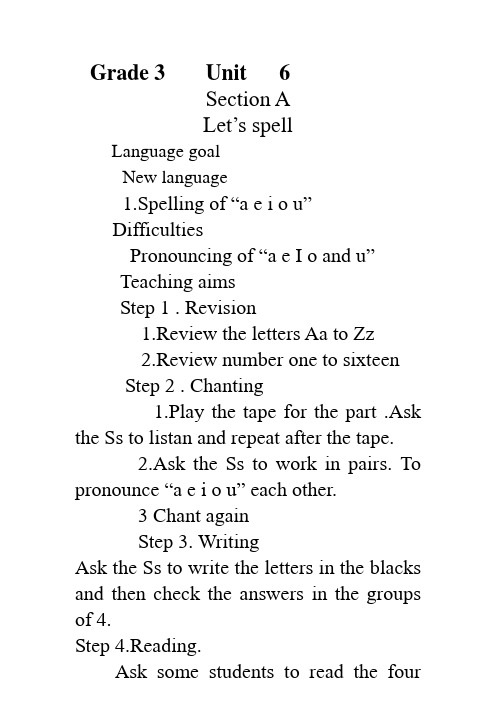
Grade 3 Unit 6Section ALet’s spellLanguage goalNew language1.Spelling of “a e i o u”DifficultiesPronouncing of “a e I o and u”Teaching aimsStep 1 . Revision1.Review the letters Aa to Zz2.Review number one to sixteenStep 2 . Chanting1.Play the tape for the part .Ask the Ss to listan and repeat after the tape.2.Ask the Ss to work in pairs. To pronounce “a e i o u” each other.3 Chant againStep 3. WritingAsk the Ss to write the letters in the blacks and then check the answers in the groups of 4.Step 4.Reading.Ask some students to read the foursentences.Step5 .Summary.Asking: What did you learn in the class ?Ask the Ss to summarize in pairs .And then say it in class.Section BLet’s taik and Let’s find outLanguage goal1.Review How many-------do you have?2.Review numbersDifficulties.1.How to using “How many”2.NumbersTeaching aimsStep 1.Revision .1.Chant “Let’schant”in Section A.2.Ask the Ss to say out the numbers from eleven to fifteen.3.Ask some questions about the things in the classroom.e.g:How many desks \books?Do the part in pairs.Step 2 New lesson.1.Leading into.Ask the Ss to look at the pictures and try to read the sentences.A: Wu Yifan Whwt’s this?B: My new crayons .A: How many crayons do you have?B: Open it and see.A: 1,2,-------16 .You have 16 crayons2. Play the tape for the talk and ask the Ss to read after it.3.Ask the Ss to read in pairs,then act out the talk in pairs in class.Step 3.Game.Let’s find out .How many-------doyou have?Do the game in the groups of ten.In each group make one student ask: How many balls do you have? The other student answers.Then say the resuits in class.Desiged by Wu Xiaokai。
PEP3UNIT6教案:学习阅读技巧的秘诀
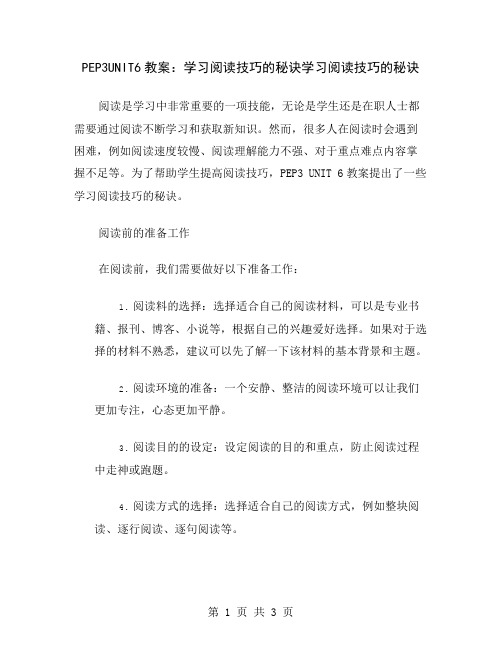
PEP3UNIT6教案:学习阅读技巧的秘诀学习阅读技巧的秘诀阅读是学习中非常重要的一项技能,无论是学生还是在职人士都需要通过阅读不断学习和获取新知识。
然而,很多人在阅读时会遇到困难,例如阅读速度较慢、阅读理解能力不强、对于重点难点内容掌握不足等。
为了帮助学生提高阅读技巧,PEP3 UNIT 6教案提出了一些学习阅读技巧的秘诀。
阅读前的准备工作在阅读前,我们需要做好以下准备工作:1.阅读料的选择:选择适合自己的阅读材料,可以是专业书籍、报刊、博客、小说等,根据自己的兴趣爱好选择。
如果对于选择的材料不熟悉,建议可以先了解一下该材料的基本背景和主题。
2.阅读环境的准备:一个安静、整洁的阅读环境可以让我们更加专注,心态更加平静。
3.阅读目的的设定:设定阅读的目的和重点,防止阅读过程中走神或跑题。
4.阅读方式的选择:选择适合自己的阅读方式,例如整块阅读、逐行阅读、逐句阅读等。
以上准备工作可以帮助我们更好地投入到阅读中,让阅读效果更佳。
阅读中的技巧阅读中,我们可以采用以下一些技巧:1.预览:通过短时间的预览,了解文章的总体框架、重要的信息和结论。
2.精读:细致认真地阅读文章内容,并通过笔记记录下来。
3.构思:阅读完文章后,可以通过构思的方式将文章总结,帮助自己更好地理解和掌握文章内容。
4.多次阅读:如果对于文章内容不是很清晰,可以多次阅读,逐步理解。
通过以上技巧的运用,可以更加高效地完成阅读任务,提高阅读速度和阅读质量。
阅读后的复习在完成阅读后,还需要对阅读内容进行复习,以加深印象和巩固知识:1.笔记复习:通过复习自己的笔记,回顾阅读过程,加深记忆。
2.知识整理:将所掌握的知识进行整理、分类和总结,形成自己的学习笔记。
3.查漏补缺:如果发现有不理解的地方,可以再次阅读、查阅相关资料,补充自己的知识。
通过以上复习方式,可以巩固所掌握的知识,为今后的学习做好充分的准备。
总结PEP3 UNIT 6教案提出了一些学习阅读技巧的秘诀,通过准备工作、阅读技巧和复习,帮助学生提高阅读效率和质量。
【教育学习文章】pep Book 3 Unit 6英文教案
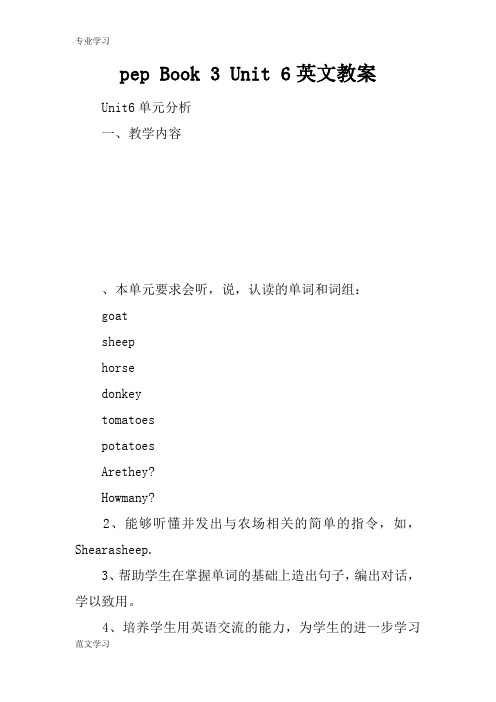
pep Book 3 Unit 6英文教案Unit6单元分析一、教学内容、本单元要求会听,说,认读的单词和词组:goatsheephorsedonkeytomatoespotatoesArethey?Howmany?2、能够听懂并发出与农场相关的简单的指令,如,Shearasheep.3、帮助学生在掌握单词的基础上造出句子,编出对话,学以致用。
4、培养学生用英语交流的能力,为学生的进一步学习奠定基础。
二、教学要求、能够听、说、认读本课时的主要单词,如hen,cow,horse,goat,lamb.2、掌握本单元出现的生词,词组和字母。
三、教学重点和难点、本单元重点学习农场上常见的牲畜和蔬菜名称以及包含名词复数形式的一般疑问句。
2、难点在于A分的Let’stalk和Let’slearn.四、教学时间本单元共6课时,每周3课时,2周完成。
Lesson1.TeachingaimsLetthestudentsmasterthewordsandexpressions:family,parents,uncle,aunt,babybrotheranddad.2.TeachingaidssomewordcardsSeveralphotos,ataperecorder,3.Teachingsteps)GreetingsandsingasongSay“Hello”toeverybody,talksomethingabouttheweatherandthedate. Thensingasongnamed“Anappleadaymakesadoctoraway”.2)NewcontentHandoutaphotoofmanymembers.Introducethefamilymember stothem.AnddescribetheminEnglish.Atthesametimethete achershowsthenewwordcardstothemandletthemreadonebyo ne.Thenthestudentsreadafterthetape3timesandaskthest udentstorememberthenewwordsatonce.Then,theteachersh owthepictureandletthempracticethem.Nextletthemtakeouttheirphotosandpracticeinpairstoin troduceanddescribeeachother’sfamilymembers.Atthesametimetheteacherwritethesente nce“comeandmeetmyfamily”“Thisismy…”“He/Sheis…”“He/Shehas…”ontheblackboard.Afterthat,chooseseveralstudentstoin troduceanddescribehis/herfamilymembersbyusingthesentence stylesontheblackboard..4.Homeworkmasterthenewwords. Listentothetapeandtrytoimitate.5.TeachingnotesLesson2.TeachingaidsAtaperecorder,aprojector,somepictures2.TeachingaimsLetthemmasterthesentences: Howmanypeoplerthereinourfamily?whoarethey?myfamilyhas…members. Letthestudentstomasterthenewwordsand Expressions:baby,people,member,puppy,only Babybrother.3.Teachingsteps)GreetingsSay“Hello”toeverybodyandtalkaboutthedate.Singasong.2)NewcontentShowapicturetothestudentsandask “Howmanypeoplearethereinthefamily?”Thenask“Howmanymembersarethereinyourfamily?”“whoarethey?”ShowthemapictureofbabyandapictureofpuppyAndteacherthemthenewwords.Letthemreaditone.Asksomeonetosaythemainideaofthetextandletthem toread.Next,thestudentsreadafterthetapetwice.Thenle tthempracticeingroupsfreely.Thenasksomegroupstoshowtheplay.4.Bingo5.HomeworkListentothetapeandtrytoimitate.Recitethedialogue.Thewholetextandmakeupanewstory.5.TeachingnotesLesson3.TeachingaimsLetthestudentmasterthewords:sister,brother,mother,f atherBaseballplayer,driver,doctor,farmer,nurseLetthestudentsmasterthesentenceswhat’surfather?myfatherisadoctor.2.TeachingaidsAprojector,somepicturesataperecorder3.Teachingsteps)GreetingsandsingasongAfterthegreetingsletthemsingasong“inmybedroom”.2)NewcontentTheteachershowthemaphotoofhisfamilyandsay “myfatherisAnofficer.mymotherisaworker.I’mateacher.”Thenheasksthem“what’syourfather?what’syourmother?”Thenaskssomeonestoanswer.Practiceseveraltimesbetwee nteacherandstudents.Theminstudents.Handoutthepictur esofthefarmersandsoonandletotherstoguess“what’stheman/woman?”Next,it’ssametothewordsofbaseballplayer,doctor,driver,farme r,andnurseontheprojector.Andaskwhocanreadthewords.A sksomeonestoread.4.HomeworkLetthestudentsrecitethenewwordsandthedialogue.writethewords:sisterbrotherfatherandmotheronthenote book.6.TeachingnotesLesson4.TeachingaimsLetthestudentsmasterthewords:look,young. Letthemmasterthesentences:who’sthisman?Helooksstrong.Isthisyour…?yes,he/sheis.No,he/sheisn’t.Aretheyfarmers?Theylookyoung. Recitethewholetext.2.TeachingaidsAprojector,ataperecorder,somepictures.3.Teachingsteps3)GreetingsSay“Goodmorning”toallthestudents.4)warmingupexercisesReviewtheexercise“Let’sdo”.5)NewcontentShowonepicyureontheprojectorandask“who’sthisman?”Thensay“Helooksstrong.”Letthestudentstoguesswhoishe.Afterthat,tellthemthechinesemeaningoflooksandhowtoUseit.Thentellthestudentsthemainideaofthestoryinchi nese.Letthemreadthetextaftertheteachersentencebysen tence.Thenreadafterthetapetwice.Givethem3minutestoPracticeingroups.chooseseveralgroupstocometothefron tToactoutthestory.Holdacompitationin4groupstoseewhic honeisthebest.4.GameDotheexercise“Let’schant”onpage74.Readafterthetape,anddoAftertheteacher.5.Homework Recitethewholetextandmakeupanewplay.6.TeachingnotesLesson5.TeachingaimsLetthestudentsmasterthenewwords:Nurse,farmer,doctor,driver.2.TeachingaidsAtaperecoder,aprojector3.Teachingsteps)GreetingsSay“Hello”toallthestudents.2)Revision Askseveralgroupstocometothefronttoactoutthetext.Askseveralgroupstocometothefronttoactthenewstorytha tThey’vemadeupafterclass.3)Readthewords:Nurse,farmer,doctor,driver.Letthestudentstofillintheblanksonpage75.Readthesentenceandaskthemtomakeupanewparagraphabout themselves.Askseveralstudentstosaysthabouthimself.4)Reviewthechantthey’velearnedlastclass.chooseseveralstudentstocometothe fronttoact.5)Gameschoose6studentstocometothefront.LetthemactastheFath er,mother,sister,brother,uncleandaunt.AskthemtoIntr oducethemselvesfirstandthenchoose3studentstointrodu cethem.Playawordgametoreviewthewordsthestudentshadlearned.6)Tellthemsonethingabouttheforeignersandthewestcoun tries.7)Teachthemanewsongnamed“She’llbecomingaroundthemountain”4.HomeworkLetthestudentsmasterthenewwordsandexpressions.Askth emtomakeupanewdialogueafterclass.5.TeachingnotesLesson6.TeachingaimsLetthestudentstomaster:family,parents,uncle,aunt,ba by,come,who,basketballplayer,people,member,only,pup py,gee,look,youngbrother,sister,father,mother,drive r,doctor,farmer,nurse2.TeachingaidsAprojector,ataperecorde,somepicturesandphotos3.Teachingsteps)GreetingsSay“Hello”toeverybody,talksomethingabouttheweatherandthedate. Thensingasongnamed“Anappleadaymakesadoctoraway”.2)RevisionDotheexerciseonpage76.Askthemtodoitingroupsandmakes omecoments.Dotheexercise“Let’scheck”listeningtothetape.Thenchecktheminpairs.Dotheexercise“Let’sfindout”toseehowmanywordscantheyfindintheletters.TellthemainideaofthestoryinEnglishandaskthestudents toreaditbythemselves.Askthemtocirclethedifficultwor dsandexpressions.chooseoneor2studentstocometothefro nttotellothersthemeaningofthestory.Thentheteachercorrecthim/her.Readtheexercise“Goodtoknow”andsaysthaboutit.3)SingasongLearnanewsongnamed“myfatherisadoctor”bylisteningtothetape.4.HomeworkLetthemtorememberthenewwordsinthisunitandrecitethet extsinthisunit.6.Teachingnotes。
Book 3 Unit 6电子教案

Unit SixSome books are to be tasted, others to be swallowed, and some few to be chewed and digested.— Francis Bacon Books are to mankind what memory is to the individual.— John Lubbock People die, but books never die. No man and no force can abolish memory.— Franklin Roosevelt Books are the quietest and most constant of friends; they are the most accessible and wisest of counselors; and the most patient of teachers.— C. W. Eliot If well used, books are the best of all things; if abused, among the worst.— R. W. Emerson The reading of all good books is like a conversation with the finest men of past centuries.— Rene Descartes Reading is not merely sympathizing and understanding; it is also criticizing and judging.— Virginia Woolf Listen to the recording and answer the following questions.1.Why do people regard books as one of the best things that they can possess or giftto their loved ones?Because every person, from a small child to an old adult, finds a friend in books.2.Do people get much opportunity to spend time in bookstores lately? Why or whynot?No, because people today have busy schedule lifestyles.3.What types of books can people buy from online bookstores?People can buy all types of books from online bookstores, from fiction to non-fiction, from comics to award-winning works.4.How is the experience of buying books online? Why?Buying books online is a fun and challenging experience because there are too many online bookstores to choose from with too many books.5.Do all the online bookstores share the same characters? If not, what are theirdifferences?No. They sell books of different categories and cater to different people with different needs and interests.6.What are the advantages of online bookstores that traditional bookstores do notpossess?Online bookstores make buying books convenient and help their customers to save money and time.ScriptThe Benefits of Buying Books OnlineBooks are one of the best things that you can possess or gift to your loved ones. From a small child to an old adult, every person finds a friend in books. But lately, due to busy schedule lifestyles, we often do not get much opportunity to spend time in bookstores. However, with the trend towards Internet marketing, things have become simple. Now, just by logging onto the Internet, you can come across a multitude of online book stores which offer a good collection of books. From fiction to non-fiction, from comics to award-winning works, there are plenty of choices to be seen when making a visit to the online bookshop.Buying books online is a fun and challenging experience. There are hundreds if not thousands of online bookstores to choose from with hundreds to hundreds of thousands of titles, and with the advent of search engines, any kind of used, new or rare books can be found.If one online bookstore does not have what you want, then you will be sure to find another online bookstore that does. For example, if you are interested in buying textbooks or reference books for your dissertation online, you will find websites that are college student oriented, sponsored by universities and colleges across the United States. If you’re interested in used books, you will also find online bookstores that specialize in used and discounted books. Online bookstores cater to the needs of individuals who need items shipped to them for convenience.Carrying such vast numbers of titles, online bookstores list their books conveniently by category. So some of the book categories you may find are: Biography, Comics/Graphic Novels, Children’s Books, Horror, Crime/Thriller/Mystery, Fiction, and a lot more. You may also find collectible, antique, and rare books, CDs and audiocassettes, photography, art and many other categories as well. Online bookstores make searching for specific authors, titles or ISBN numbers easy by allowing you to type in that author, title or ISBN number in a search bar to find what you’re looking for. Online bookstores also have customer service by phone line or online form if you have trouble finding what you’re looking for.Buying books online also gives you the option to purchase books through auction websites, which can discount the costs dramatically. Most book sellers believe in satisfaction guarantees in order to cover any accidentally damaged books. They may also have their own company policies on exchanges and returns. Many times you can find that their customer service is only a mouse click away. This just enhances the fact that buying your books online will not only save you money but also time.Words and phrases:(1) shelter: n. [uncountable] protection from danger or from wind, rain, hot sun, etc.e.g. They stood under the shelter of a huge tree when it poured with rain lastnight.Provision of shelter was their main concern for the disaster victims.(2) unaware: a. not noticing or realizing what is happeninge.g. She was completely unaware of there being anything extraordinary.Mike seems unaware of the trouble he’s causing.(3) surroundings: n. [plural] the objects, buildings, natural things, etc. that are arounda person or thing at a particular timee.g. The policeman switched on the light and examined his surroundings.The protective color of some plants and animals changes with theirsurroundings.(4) irresistible: a.so attractive and desirable that one cannot prevent himself fromwanting it; too strong or powerful to be stopped or preventede.g. The striving for peace and cooperation, and the promotion of developmenthave become irresistible historical trends.Both the presentation and variety of goods for sale make shoppingirresistible.(5) end up with: finish with the possession of someone or something or in thecompany of someone or somethinge.g. We end up with nothing after all these years, and that’s your fault.I thought my date was with Sally, but I ended up with her twin sister.(6) engrossed: a. giving or marked by complete attention toe.g. My father was deeply engrossed in the book for the whole night.Students tend to neglect schoolwork once they get engrossed in activities asonline gaming.(7) dash: v. go or run somewhere very quicklye.g. I must dash upstairs and run a comb through my hair since the party is tobegin very soon.The secretary dashed into her office, grabbed her bag, and ran out again. (8) wander: v. walk slowly across or around an area, usually without a clear directionor purposee.g. Those who do not have relatives to return to are left to wander the streetsand sleep rough.He told us that we could wander around at will.(9) to one’s heart’s content: as much as one likes or wants, to one’s entire satisfactionand without limitatione.g. She took refuge in the library, where she could read to her heart’s content.Since we didn’t have to put on a false front, we could laugh about theincident to our heart’s content.(10) approach: v. move towards or nearer to, get closer toe.g. You must approach the bird very quietly or it will fly away.As people approach old age, their energies may diminish.(11) inevitable: a. certain to happen and impossible to avoide.g. Borrowing word is an inevitable linguistic phenomenon in communicationbetween different cultures.Stress is inevitable and no one can ever be stress-free.(12) remain: v. stay in the same place without moving awaye.g. To everyone’s great surprise, such a healthy person should remain in thehospital for a solid month.The soldiers were instructed to remain where they were.(13) browse: v. look through the pages of a book, magazine, etc. without a particularpurpose, just looking at the most interesting partse.g. Why don’t you sit down at that table and browse through the paper?People can browse the classified advertisements in the newspaper for someinformation.(14) section: n. one of the parts that something such as an object or place is dividedintoe.g. This section of the market has slowly declined in importance.You will find that book in the historical section of the library.(15) retire: v. go away to a quiet placee.g. Eisenhower left the White House and retired to his farm in Gettysburg.Nowadays more and more people retire to the country, where they canenjoy peace and fresh air.(16) discreetly: ad. doing or saying in a polite and careful way to avoid embarrassingor offending someonee.g. I took the phone, and she went discreetly into the living room.They were all proud students, so the teacher did it discreetly.(17) variety: n. things of the same type that are different from each other in some waye.g. The guests from the neighbourhood are amazed by the variety of plants inthe region.Man had achieved a remarkable understanding of a wide variety of naturalphenomena.(18) vaguely: ad. not clearly or exactlye.g. The name sounded vaguely familiar to her.He wondered uneasily what it meant, and began to feel vaguelyapprehensive.(19) illustrate: v. make the meaning of something clearer by giving examplese.g. Let me give an example to illustrate the point.I can cite quite a few instances to illustrate.(20) apart from: except fore.g. Apart from a few words, he knows nothing about Chinese.Apart from the little infection he had caught in his hometown, his healthwas sound.(21) indulgent: a. willing to allow someone, especially a child, to do or have whateverthey want, even if this is not good for theme.g. We all think he is too indulgent with his children.Mr. Green is indulgent of others’ shortcomings.(22) obtain: v. get or achieve what one wants, especially through his own effort, skill,or worke.g. You will need to obtain permission from the principal.The perfect body has always been difficult to obtain.(23) dismayed: a. worried, disappointed, and upset when something unpleasanthappense.g. They were dismayed that the demonstration had been allowed to takeplace.He was astonished, but by no means dismayed.(24) beckon: v. make a signal to someone with your hand, to show that you want themto come towards you or to follow youe.g. She beckoned to him and he went into her office.I could see my husband beckoning me.(25) tuck: v.put something into a small space, especially in order to protect, hide,carry, or hold ite.g. He took the glasses off and tucked them in his pocket.Tuck a bag of raisins in your purse or bag for an easy snack.(26) tempt: v. attract and make sb. want something, even though it may be wrong orharmfule.g. Nothing can tempt me to do such a thing.I shouldn’t have let you tempt me into talking of the old days.(27) delighted: a. very pleased and happye.g. I am very delighted to hear the news of your success.He looked at the honest parents, with their delighted children laughing andclapping their hands。
PEP3UNIT6教案:用实用方法提高阅读能力
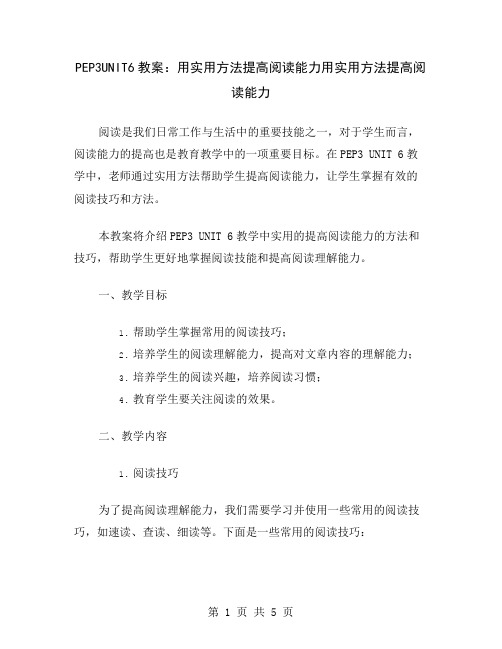
PEP3UNIT6教案:用实用方法提高阅读能力用实用方法提高阅读能力阅读是我们日常工作与生活中的重要技能之一,对于学生而言,阅读能力的提高也是教育教学中的一项重要目标。
在PEP3 UNIT 6教学中,老师通过实用方法帮助学生提高阅读能力,让学生掌握有效的阅读技巧和方法。
本教案将介绍PEP3 UNIT 6教学中实用的提高阅读能力的方法和技巧,帮助学生更好地掌握阅读技能和提高阅读理解能力。
一、教学目标1.帮助学生掌握常用的阅读技巧;2.培养学生的阅读理解能力,提高对文章内容的理解能力;3.培养学生的阅读兴趣,培养阅读习惯;4.教育学生要关注阅读的效果。
二、教学内容1.阅读技巧为了提高阅读理解能力,我们需要学习并使用一些常用的阅读技巧,如速读、查读、细读等。
下面是一些常用的阅读技巧:(1)速读:快速阅读,获取文章的大意和主题的技巧,主要通过快速浏览文章并忽略细节,寻找文章中的关键词。
(2)查读:针对某一特定问题或主题进行细读,重点查找相关信息,主要通过在短时间内大量阅读并查找相关信息。
(3)细读:通过仔细阅读文本的每个分句和段落来理解细节和关键概念,主要通过慢慢阅读逐字逐句地阅读文本,注重理解细节和细节。
2.阅读理解能力阅读理解能力是阅读能力的核心,通过阅读理解能力,我们可以准确、深入地理解文章内容,并掌握文章中的主题、意图、信息和论点。
提高阅读理解能力有很多方法,例如:(1)根据上下文推断:上下文是指文章中的文本环境。
通过根据上下文的信息推断未知词汇的词义、语法结构、主题和文本可以帮助学生更好地理解文章内容。
(2)细化问题:针对每个问题,我们可以将问题细分为更小、更可控的组成部分。
通过这种方法可以帮助学生理解问题,并帮助他们快速找到答案。
(3)总结整理:通过总结整理帮助学生提炼关键信息、强化理解和记忆,思考文章的整体构成和主题,帮助他们掌握文章的核心概念和主题。
3.阅读兴趣和阅读习惯阅读兴趣和阅读习惯是影响阅读能力的重要因素。
英语三年级上册 U3-6 教案
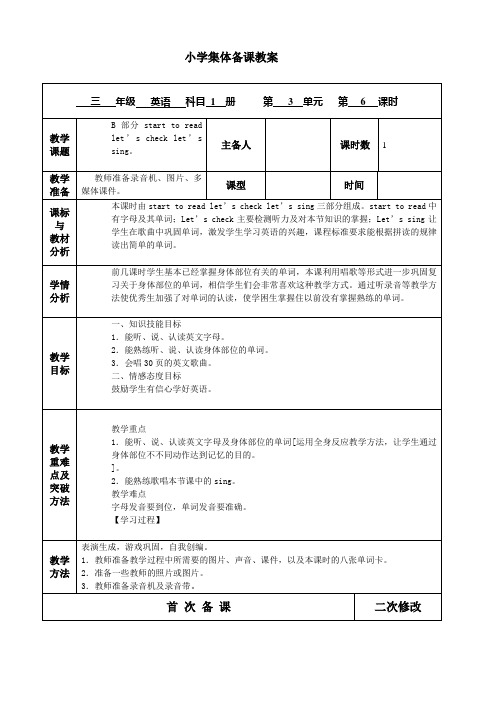
(一)跟读模仿,听做强化
1.跟读录音,男女生分角色问答练习,强化模仿。
2.Read and count。
(二)游戏巩固,任务落实
1.Let’s sing
2.Listen and number.
3.Look and match.
【设计意图】通过变换不同的趣味操练,很好地调动了学生学习的积极性,有利于激发学生学习的兴趣。
(四)版式呈现,视听正音
1.通过板书呈现字母和单词
2.听一听,练一练
当堂检测
课外听力u3
板书设计
3 Look at me
B Start to read Let’s check Let’s sing
hand nose ear leg mouth
body ear foot arm eye body
课后反思
学情分析
前几课时学生基本已经掌握身体部位有关的单词,本课利用唱歌等形式进一步巩固复习关于身体部位的单词,相信学生们会非常喜欢这种教学方式。通过听录音等教学方法使优秀生加强了对单词的认读,使学困生掌握住以前没有掌握熟练的单词。
教学
目标
一、知识技能目标
1.能听、说、认读英文字母。
2.能熟练听、说、认读身体部位的单词。
表演生成,游戏巩固,自我创编。
1.教师准备教学过程中所需要的图片、声音、课件,以及本课时的八张单词卡。
2.准备一些教师带。
首次备课
二次修改
教
学
过
程
一、 热身(Warm-up)
3分钟口语展示
说唱做演,激情引趣
(一)歌曲、歌谣中情绪热身
带领学生一起吟唱课本第30页的歌曲。
新技能英语基础教程3 电子教案 tu6-2
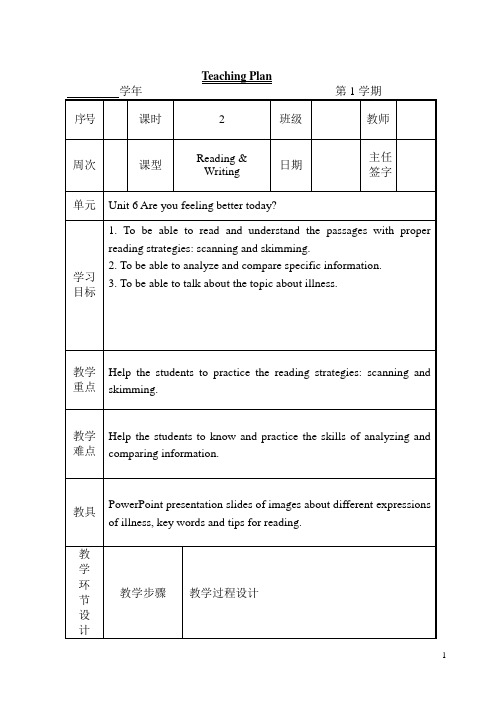
Pre-reading
I. Ask the students to tell a short experience of seeing a doctor.
keep fit.
Consolidation
I. Present a chart about the different attitudes towards illness and ask the students to retell it. II. Ask the students to share their experiences of seeing a doctor using the words and phrases just learnt.
1. Going to hospital means wasting a lot of
time.
2. It was her smile that made me feel relaxed.
3. A smile from a nurse is much better and more
effective than any medicine.
4. If I am sick, I first think about whether I can
manage it at home.
5. If I don’t feel better soon, Ihelp.
1. Ask the students to memorize the vocabulary and
小学英语教案:pep3 unit6 Meet my family(6)
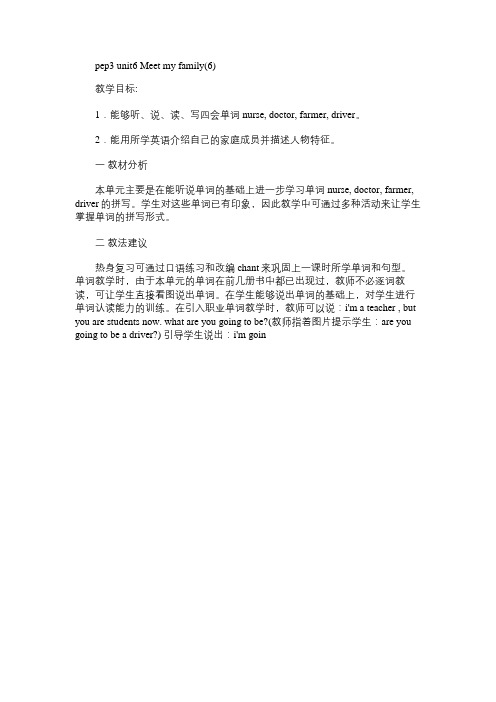
pep3 unit6 Meet my family(6)
教学目标:
1.能够听、说、读、写四会单词nurse, doctor, farmer, driver。
2.能用所学英语介绍自己的家庭成员并描述人物特征。
一教材分析
本单元主要是在能听说单词的基础上进一步学习单词nurse, doctor, farmer, driver的拼写。
学生对这些单词已有印象,因此教学中可通过多种活动来让学生掌握单词的拼写形式。
二教法建议
热身复习可通过口语练习和改编chant来巩固上一课时所学单词和句型。
单词教学时,由于本单元的单词在前几册书中都已出现过,教师不必逐词教读,可让学生直接看图说出单词。
在学生能够说出单词的基础上,对学生进行单词认读能力的训练。
在引入职业单词教学时,教师可以说:i'm a teacher , but you are students now. what are you going to be?(教师指着图片提示学生:are you going to be a driver?) 引导学生说出:i'm goin。
Unit6-电子教案

(捷进英语2)U n i t6-电子教案(共5页)--本页仅作为文档封面,使用时请直接删除即可----内页可以根据需求调整合适字体及大小--教案课程名称捷进英语综合教程2课时班级专业教师系部教研室教材《捷进英语综合教程2 教师用书》Sense and memoryImproving your memoryPerfect memories?Reading for learningSense and memoryReading for DoingDon’t Forget!Guided WritingA QuestionnaireAudio/Video LabIf you have time before the lesson youcould prepare your own timeline to displayto the class.This section startswith identifyingexamples andusing them tohelp the studentunderstand thetext. It alsoencouragesstudents toproduce a briefsummary of thetext.Vocabulary andGrammarThe first two tasks work on the meaning of thematic words from the text. Task 3 looks at various fixed phrases from the text. The grammar section looks at the passive voice in the present and past simple.The first two tasks encourage students to form an understanding of examples. When doing Task 4, if you have a strong class you could simply write the three headings on the board and ask students to write their own summary sentences.The first vocabulary tasks draw on topic vocabulary from the text.The second vocabulary task can be easily extended by asking students to give written or spoken answers to each question.The Grammar Focus part looks at the passive voice in the present and past simple. Task 2 contains factually true sentences. You could extend this by asking students to write their own general knowledge quiz in the passive voice. The topic in Task 3 can also be extended into a discussion task.Beyond the text This section also recycles the passive in a fun way by creating realBeyond the Text Students look at two puzzles and write their own puzzle.Ss read an article giving advice on improving your memory.This section should take less time than section B as the texts are less complicated. They focus on developing students’ everyday reading skills.If you have more time, you could develop the final task on revision planning and strategies further.Students write, ask and answer a questionnaire.Before the lesson you could find examples of questionnaires online.When doing Task 5 you might need to provide some model questions for more support.For each part of the video you might want to play it twice.Tasks 3 provides a good opportunity for using visuals to help you understand a lecture.This section provides a quick review of the vocabulary, grammar, writing and theme of the unit.Tasks could be set for individual work or done in pairs. For the first tasks on the language work you might want to set them up as a team game or class quiz.For the final tasks these could be set as small group discussion or down as a reflective writing task.Finish all the tasks in Unit 6.Read the two texts in this unit again and try to summarise their contents.Prepare a PPT presentation on your survey result in Task 3 of the warp-up section.。
- 1、下载文档前请自行甄别文档内容的完整性,平台不提供额外的编辑、内容补充、找答案等附加服务。
- 2、"仅部分预览"的文档,不可在线预览部分如存在完整性等问题,可反馈申请退款(可完整预览的文档不适用该条件!)。
- 3、如文档侵犯您的权益,请联系客服反馈,我们会尽快为您处理(人工客服工作时间:9:00-18:30)。
Ss read 10 tips to survive in the wild.
Ss complete follow up vocabulary and comprehension activities. They then write their own survival tips for a range of everyday situations.
Reading
(阅读)
Readingfor learning
This section starts with introducing Ss to features of the memoir genre. Ss then go on to read an account of how a reality show contestant survived a difficult experience. They go on to comprehension questions and discuss their own opinions about reality shows.
This section should take less time than section A as the text is much shorter and more straightforward.
Monitor as students write their tips, offering language tips wherever possible.
课时安排
8
教
学
内
容
Reading for Learning
Surviving My Castaway Hell
Readingfor Doing
Have You Got What It Takes?—10 Tips to Survive in the Wild
Guided Writing
A Formal Letter of Application
Before reading the text, Ss will need some cultural input. Refer them to the cultural notes in their course book and use the teaching notes on the next page to answer any questions they may have.
Pre-teach vocabulary before Ss listen to the radio interview. Take time to drill pronunciation of the items on the list.
If you have time, ask Ss to role-play a quiz show like the one they have watched (using the discussion questions in Task 4).
Encourage Ss to offer constructive feedback on the usefulness of their peers’ tips.
Guided Writing
A letter of application (to appear on a reality show):
Allow students to discuss their answers to the quiz questions with a partner. Encourage students to respond to the result they get from the quiz by asking whether they agree or disagree with it.
(1) The structure of the letter
(2) Linking words
(3) Formal language
Encourage Ss to self-assess their own writing by writing a check-list on the board.
In Task 3, encourage Ss to addtheir own adjectives to the list. Be sure to drill the pronunciation of potentially tricky words, e.g.:idyllicandclaustrophobic.
Vocabulary andGrammar
Ss practise using new wordsand phrasesfrom the text. They will also learn about modal verbs.
Beyond theText
Ss read the character profiles of seven people. They then work in small groups to select a group of four individuals who can take part in a desert expedition.
Wrap-up
This provides a review of the vocabulary, grammar, writing and theme of the unit. Tasks could be set for individual work or done in pairs.
The language work tasks can be approached as a team game or class quiz.
Write a letter ofapplication for a summer caulary Section allows students to practise the words and phrases they have met in the reading text. It encourages students to guess the meaning of new words by their context. Try to personalise the new vocabulary wherever possible as this will help your students to remember it.
教案
课程名称捷进英语综合教程3
课时
班级
专业
教师
系部
教研室
教材《捷进英语综合教程3教师用书》
TeachingPlan
教学
单元
Unit6Against All Odds
单元
主题
A real-life castaway
Tips for surviving in thewild
Survival quiz show
When reading Rory’s letter highlight any language which Ss will find useful when it comes to writing their own letters of application.
Audio/VideoLab
Ss listen to a radio interview with a teenager who survived being lost in the Australian Bush.
TheGrammarFocuspart looks atmodal verbs. If you have time, the Extra activity will help to personalise the new language for Ss.
To ensure the success of this activity, make sure that you spend sufficient time setting it up beforehand. Take time to discuss with your class the challenges which this expedition would present to the people. Make sure students realise that they must all be in complete agreement about their choice before completing the task.
The final tasks could be set as small group discussion or as reflective writing tasks.
课后学习设计
作业
Finish all the exercises in Unit6.
Read thetwo texts in this unit again and try to summarise their contents.
Audio/Video Lab
教学环节主要特色
教学活动安排建议
Warm-up
(热身)
Thewarm-upintroduces the topic with a light hearted quiz which allows Ss to assess their own survival skills. It leads into the reading text by presenting students with a picture of the Scottish island featured in the reading text. Ss are asked to imagine what life would be like there.
